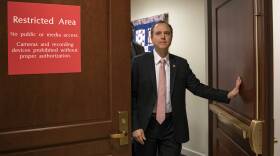EXPLORE MORE
Coming up Tuesday on BPR, live from the BPL:
Ask The Mayor with Boston Mayor Michelle Wu, 12-1pm
CNN’s John King
NBC Sports Boston’s Trenni Casey
Recent segments
-
Ali Noorani Weighs In On The Future of DACA
The National Immigrant Forum executive director said the court's decision is likely to impact millions. -
Joan Baez And Betsy Siggins On Decades Of Folk Music And Activism At Club Passim
Club Passim is celebrating 60 years on the scene. -
Paul Reville: As Higher Education Costs Skyrocket, The 4-Year College Model Is 'Breaking Down'
As the cost of a four-year liberal arts education is set to hit $100,000 at some institutions, less and less people are graduating through that model. -
Montana Gov. Steve Bullock Says He's Prepared To Tackle Dysfunction In Washington
On Tuesday, Bullock joined Boston Public Radio to discuss the state of his presidential campaign. -
Marika Aubrey Talks 'Come From Away'
The Australian actor discussed the Tony-winning musical currently showing in Boston. -
John King: Opening Hours Of Public Impeachment Hearings Are Critical For Democrats
Democrats will conduct the first public impeachment hearings on Wednesday.
Listen to previous shows
-

BPR Full Show: Skate Hags, dickies and the art of baton twirling
Today on Boston Public Radio: Shirley Leung talks about what GE’s split will mean for Massachusetts, and Tito Jackson’s seven-story cannabis venture near Faneuil Hall. Leung is a business columnist for The Boston Globe and a Boston Public Radio contributor. Then, we ask listeners about if the latest surge in COVID-19 cases is changing their behavior at this point in the pandemic. Bill McKibben reports back from the COP26 climate summit in Glasgow, and why the summit did not rise to his hopes without a strong climate agenda passed from the U.S. McKibben is co-founder of 350.org and the author of numerous books about climate change. His latest book is “Falter: Has the Human Game Begun to Play Itself Out?” Andy Ihnatko updates listeners on the latest news from the tech industry, including new accessibility tools in development for speech-impaired smartphone users, and smartphone features that allow users to designate people to access their data when they die. Ihnatko is a tech writer and blogger, posting at Ihnatko.com. Sue O’Connell talks about the US Navy launching a ship named for gay rights leader Harvey Milk, and long-time anchor Brian Williams announcing his exit from NBC. O’Connell is the co-publisher of Bay Windows and the South End News, as well as NECN's political commentator and explainer-in-chief. Octavia Bennett, Jen McMahon and Jen Millis share the meaning behind their group name, Skate Hags, and how they built community around roller skating during the pandemic. Bennett, McMahon and Millis are the founders of the roller skating collective Skate Hags. We end the show by talking with listeners about what vintage trends – in addition to roller skating – have made a comeback in recent years. -

BPR Full Show: Thank You Culture
Today on Boston Public Radio: Chuck Todd weighs in on the blowback from Green Bay Packers’ Aaron Rodgers lying about his vaccination status, and updates listeners on the latest political headlines, including 13 House Republicans voting for the infrastructure bill. Todd is the moderator of “Meet the Press,” host of “Meet the Press Daily” on MSNBC and the political director for NBC News. Then, we ask listeners their thoughts on the floundering state of bipartisanship, and how -- or if -- we should work to bring the country together. Andrea Cabral provides updates on the latest in the Kyle Rittenhouse trial, and mob members starting podcasts. Cabral is the former Suffolk County sheriff and the former Massachusetts secretary of public safety. She is currently the CEO of the cannabis company Ascend. Former Army Captain Erik Edstrom shares his experiences in the military, including how he helped get his interpreter out of Afghanistan, and where he thinks the government has gone wrong when it comes to the military. Edstrom was born and raised in Stoughton, Mass., and graduated from West Point and deployed to combat in Afghanistan as an infantry officer. He’s also a senior fellow at the Eisenhower Media Network. His latest book is “Un-American: A Soldier’s Reckoning of our Longest War.” Then, we talk with listeners about the military-civilian divide, and whether a year of mandatory service would unite the country. Cassie Piuma talks about how her Somerville restaurant Sarma fared throughout the pandemic. Piuma is a multi-time James Beard Nominee for Best Chef in the Northeast and the Chef and Owner of Sarma in Somerville, which was named Boston’s Best Restaurant by Boston Magazine. We end the show by talking with listeners about the work-life balance, and if employers should be allowed to contact their employees after hours. -

Corby Kummer on the Dining Shed Dilemma
Award-winning food writer Corby Kummer joined Boston Public Radio on Wednesday to explain why outdoor dining could destroy neighborhoods, following a recent New York Times article on issues with outdoor dining sheds in the Lower East Side. Small business owners in the neighborhood have lodged complaints about high noise levels, increasing rat populations, and trash generated from restaurants’ outdoor dining sheds, claiming that the area has become “unlivable.” “It's other businesses that are trying to keep alive next to [outdoor dining sheds] now,” Kummer said. “I hope that Boston will do a better job of responding to complaints. [Small businesses] are on margins as thin as a lot of the restaurants.” While outdoor dining has served as a boon for restaurants throughout the pandemic, Kummer notes that long-term solutions for both restaurants and local businesses must be found. “Cambridge, for example, has been so ahead of other cities in terms of bike-friendly lanes and pedestrian zones,” Kummer said. “I think the answer is going to be a great parking lot behind Central Square — just making things pedestrian zones over the long run.” Kummer is the executive director of the Food and Society policy program at the Aspen Institute, a senior editor at The Atlantic and a senior lecturer at the Tufts Friedman School of Nutrition Science and Policy. -

BPR Full Show: BPR and Chill
Today on Boston Public Radio: We begin the show by asking listeners if they have quit their job or gone on strike, as many use this stage in the pandemic to try something new in their lives. Lylah Alphonse reports on the latest news from Rhode Island, including a coach fired from a South Kingstown school after conducting “fat tests” on naked male athletes, and the latest political headlines from the state. Alphonse is the Rhode Island editor for the Boston Globe. Juliette Kayyem updates listeners on the status of the Jan. 6 investigation, and what happened at the tragedy at Astroworld Festival in Houston, where eight people died during a crowd surge at a Travis Scott concert. Kayyem is an analyst for CNN, former assistant secretary at the Department of Homeland Security and faculty chair of the homeland security program at Harvard University’s Kennedy School of Government. Corby Kummer weighs in on the pros and cons of outdoor dining, and recent investigations into sexual harassment at fast food joints. Kummer is the executive director of the food and society policy program at the Aspen Institute, a senior editor at The Atlantic and a senior lecturer at the Tufts Friedman School of Nutrition Science and Policy. Michael Bobbitt talks about the state of the arts and culture sector at this stage in the pandemic, and gives an overview of the Massachusetts Cultural Council’s first ever racial equity plan. Bobbitt is the executive director of the Massachusetts Cultural Council. Matt Gilbert discusses what’s new on TV, including the latest seasons of “Succession” and “Dexter” and the prevalence of psychiatrists on screen. Gilbert is the TV critic for The Boston Globe. We end the show by asking listeners what they’ve been watching on TV lately. -

BPR Full Show:
Today on Boston Public Radio: We begin the show by asking listeners their reactions to a recent wave of harassment in youth sports, after Danvers school officials faced calls to resign amid reports of hazing on a boys hockey team. Trenni Kusnierek discusses recent reporting on hazing rituals on a boys hockey team in Danvers, including sexual misconduct and pressure to use racist and antisemitic epithets. Kusnierek is an anchor and reporter for NBC Sports Boston, as well as a Boston Public Radio contributor. Lyndia Downie talks about the wake of last week’s tent clearing at Mass. and Cass, and why it’s so hard for people to get into long term treatment for drug addiction. Downie is the president and executive director of Pine Street Inn, one of the largest agencies serving homeless people in New England. Will Fitzgibbon and Evan Williams previews their reporting on the Pandora Papers, which showed how some of the wealthiest people across the globe hide their wealth from authorities and the public. Williams is a reporter and producer with Frontline. Fitzgibbon is a senior reporter with the International Consortium of Investigative Journalists. Jim Aloisi and Stacy Thompson talk all things transportation, including Beacon Hill’s response to Mayor-elect Michelle Wu’s plan to free the T. Aloisi is the former Massachusetts transportation secretary, a member of the Transit Matters board and a contributor to Commonwealth Magazine. Thompson is executive director of Livable Streets. John King updates listeners on the latest political headlines, including Republican Rep. Paul Gosar of Arizona sharing an altered anime video of him killing Rep. Alexandria Ocasio-Cortez and going after President Joe Biden. King is CNN’s chief national correspondent and anchor of “Inside Politics,” which airs weekdays at noon and Sundays at 8 a.m. We end the show by asking listeners their opinion on Wu’s proposal to make the MBTA free.








